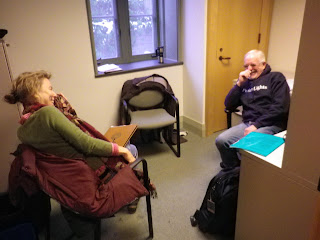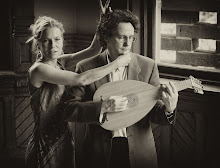On Friday we met with Prof. David Klausner who is reading verses of the wedding poem, or epithamalion, Hail Bishop Valentine by John Donne about the wedding of Princess Elizabeth Stuart, daughter of King James I of the newly United Kingdom, as part of our next concert (Feb. 12th at Charbonnel Lounge, St. Michael’s College, 81 St. Mary Street, 7:30 PM, Tickets $25/20). Between the verses of the Donne poem we will sing Jacobean love songs and I'll play some lute solos with titles like Solus cum Sola (He and she alone together) and The Lady Elizabeth, Her Mask. Any time you meet with David it's a fun time as you can see from the picture. He is 'Acting Director of Celtic Studies' at St. Mike's College this term. You'd think such a title would get him a bigger office. David wrote the book, or at least large chunks of it, on how to pronounce early modern English for singers.
 |
| Princess Elizabeth Stuart |
In the fall we did a concert on the 400th anniversary of the death of Henry, Prince of Wales, Elizabeth Stuart's big brother, who would have been Henry IX, had he lived. For the upcoming show we wanted to sing a song which we did at that concert, music by John Coprario and words by Thomas Campion, on Elizabeth's reaction to her brother's death, but there is no mention of the sad event in Donne's poem, though it was only a few months before the wedding. To introduce the Coprario/Campion song we'll hear a reading from this chunk of text which is from a book called The life and death of our late most incomparable and heroique prince, Henry Prince of Wales. A prince (for valour and vertue) fit to be imitated in succeeding times and purports to be a letter from Sir Charles Cornwallis to a friend.
In it you'll read about the excitement about the Royal Wedding match, which includes those foreign policy questions of whether to chum up to the Spanish or someone more Protestant. You'll read about how involved Henry Prince of Wales was in the negotiations for the marriage and how he would hang out with his soon to be brother-in-law, Frederick, Count Palatine, here referred to as 'the Palsgrave'. And you'll read about the sad end after overdoing it at sports.
Henry, Prince of Wales
At last to Saint James's he came, seeming well, but that he looked pale and ill, so that sundry did speake suspiciously of his lookes, fearing some distemper in his body: yet so strong was his minde, that complaining of nothing, he did beare out the matter very bravely in shew, being so well, that he gave his physitian (who had waited a long time) leave to goe home to his house; meane while his indisposition still continuing and increasing, there might have beene perceived in him a sudden great change; for he began to be displeased almost with every thing, and to be exceeding curious in all things, yet not regarding, but looking, as it were, with the eyes of a stranger upon them; for sundry things shewed him, which before he had wonted to talke of, aske questions, and view curiously, he now scarce vouchsafed to looke upon, turning them away with the backe of his hand, and departing, as who would say, I take pleasure in nothing; yet was he wonderfully busie in providing, and giving order for every thing belonging to his care, for his sister's marriage, advancing the same by all meanes possible, keeping also his highnesse the Palsgrave company, so much as conveniently he could, together with count Henry his excellencie, Grave Maurice his brother, whom he also much honoured and esteemed, belike because of a noble and heroicke disposition, which he saw in him fitting his humour, with whom he used to play often at cardes, and tennis, delighting much in his company; and above all the rest, one great match they had at tennis, on Saturday the 24. of October, the day before his last sicknesse, where his undaunted courage, negligently, carelesly, and wilfully (neither considering the former weake estate of his body, danger, nor coldnesse of the season) as though his body had been of brasse, did play in his shirt, as if it had beene in the heate of summer; during which time he looked so wonderfull ill and pale, that all the beholders took notice thereof muttering to one another what they feared; but he (the match being ended) carried himself so well, as if there were no such matter, having all this while a reasonable good stomack to meat; yet this night, at his going to bed, complaining more than usual of his lazinesse and head-ache.
Frederick V, Elector Palatine
But oh, whether goe I now? must I againe launch out into a sea of sorrowes, adding more griefes unto our yet bleeding wounds? Oh Death! was there no remedy? When wilt thou make an end? shall the grave devour alwayes? was thy charge so strait, that thou could'st shoote neither at great nor small, but at the prince of our Israel? doe sweete-smelling flowers so much delight thy grisly ghastly senses appetite, that thou wouldst gather none but our fairest, well beloved, scarce blowne rose? why didst thou so soone robbe us?Sad stuff. Sadder this that Mr. Chamberlain writes to Sir Dudley Carleton on the 12th of November 1612.
The Lady Elizabeth is much afflicted with this loss, and not without good cause ; for he did extraordi- narily affect her, and during his sickness enquired after her, and the last words he spake in good sense, they say, were "Where is my dear sister?




